小组PRESENTATION- Outline
- 格式:doc
- 大小:32.50 KB
- 文档页数:4

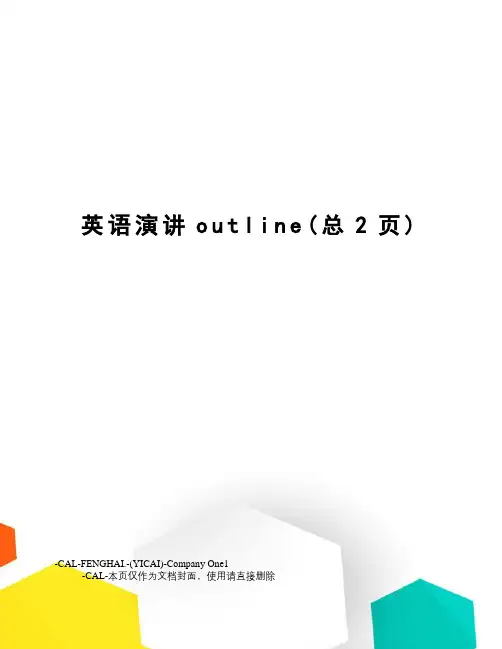
英语演讲o u t l i n e(总2页) -CAL-FENGHAI.-(YICAI)-Company One1-CAL-本页仅作为文档封面,使用请直接删除The spice of my lifeOutlineSpecific purpose: To inform my audience about my experience living with my sisterCentral idea: To tell the story and feeling living with my sister.IntroductionEye contactRecently, China is about to carry out generally two-child policy. People have different views on the policy. Businesspersons discover new opportunities. Young parents are considering if they want a second child. How about you Most of you are the only child. When you heard the policy, are you happy your parents won’t want a second at this age Or do you feel ashamed the policy carrying out so late Slow down .But for me, as an older sister, my emotion is complex. I think of my experience living with my sister. She is like the spicy of my , according to my feeling I will divide the experience into four stages to share with you. (preview statement)(transition: let’s get down the first stage, sour)BodyI. The first stage is my mother was pregnant, my feeling is sour. In other words, I was jealous of the little life.A.The reason why I hate younger sister1. Before, I heard that if you had a younger sister or brother, all of yourthings would be shared. I believe it without doubt.my mother was pregnant, I was not allowed to be close to my mother, my mother ate much delicious foods for baby.B. a conversation with my mother to show my disgust.I remember, she asked me a question: Do you like little sister or brother I said: Neither. If it is born, I will kill it.(transition: After the first stage, since my sister was born, mylife has changed a lot. At that time, I was 9 years old.)pauseII. The second stage is bitter. It’s the period of my sister from 1 to 4 years old.A.Introduce my sister’s characteristic sIn the stage, my sister didn’t understand anything. She is so small, I didn’t dare to hug her, I was also afraid of others hugging her. How fragile she is. If someone was closed to her, I would separate them.B.It’s worse, I had to look after herWhen my mother was busy, she shouted at me “look after your sister,quickly.” One time, when I rocked her in my armed, unexpectedly,she peed on my clothes.(transition: through the bitter life, I ushered in my third stage) pauseIII . The second stage is spicy.A.In the period, she was so naughty so that my homework died of herhands.B.And when I played with my friends, she must follow me.C.Sometimes, she quarreled with me, even hit me. However, If I also hither, The little kid would tell mom. I was really sick of her. (transition: it seems that between of us filled with terrible recall. until……) pause slow downIV The fourth stage is sweet.(preview) before, I thought I couldn’t wait to go away with her, however, when the moment comes, my heart is full of sweet missA.When I am away my home for schooling, nobody is noisy around with me.It’s too quiet for me.B.(in fact) She is never selfish, she always shares her food and toys withme even though I don’t care.C.When she calls me, s he asked,”sister, are you ok When will you gohome”I know she misses me.D.ConclusionEye contactI. In a word, (pause)it’s as the saying goes, you don’t miss your water. When the time we are together is less and less, I discoverthat it is not inexistent, but I ignore the happiness between my sister and I.II. From the experience living with my sister, I get tolerant, responsible and mature.III. Thanks for my mother, I have a sister accompany me forever. At the same time, thanks for the policy, more and more people will have sister or brother to enrich his life and experience sour, bitter, spicy and sweet.BibliographyNetease. (2015, October29). CCP Central Committee carrying out generally two-child policyRetrieved from Sina Net Finance, (2015,November 4). Who is two-child policy forRetrieved from X (2012, October). The research of one-child students groups characteristics. Kinetic Theory, section 26。
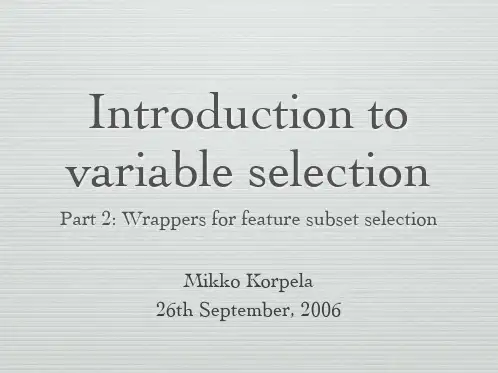
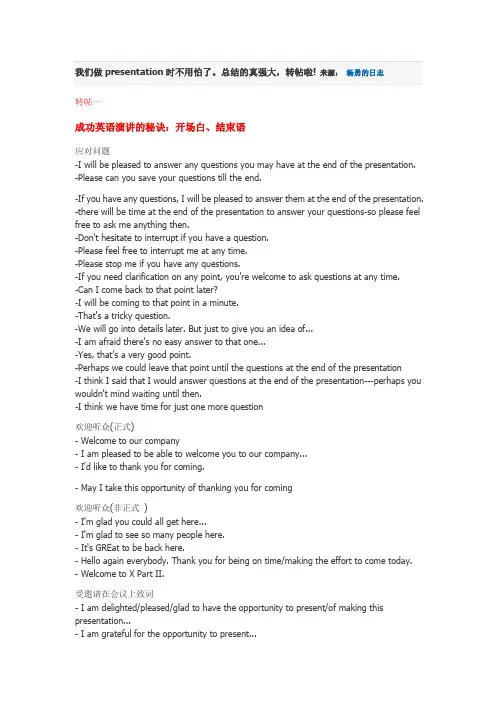
转帖一成功英语演讲的秘诀:开场白、结束语应对问题-I will be pleased to answer any questions you may have at the end of the presentation. -Please can you save your questions till the end.-If you have any questions, I will be pleased to answer them at the end of the presentation. -there will be time at the end of the presentation to answer your questions-so please feel free to ask me anything then.-Don't hesitate to interrupt if you have a question.-Please feel free to interrupt me at any time.-Please stop me if you have any questions.-If you need clarification on any point, you're welcome to ask questions at any time.-Can I come back to that point later?-I will be coming to that point in a minute.-That's a tricky question.-We will go into details later. But just to give you an idea of...-I am afraid there's no easy answer to that one...-Yes, that's a very good point.-Perhaps we could leave that point until the questions at the end of the presentation-I think I said that I would answer questions at the end of the presentation---perhaps you wouldn't mind waiting until then.-I think we have time for just one more question欢迎听众(正式)- Welcome to our company- I am pleased to be able to welcome you to our company...- I'd like to thank you for coming.- May I take this opportunity of thanking you for coming欢迎听众(非正式)- I'm glad you could all get here...- I'm glad to see so many people here.- It's GREat to be back here.- Hello again everybody. Thank you for being on time/making the effort to come today. - Welcome to X Part II.受邀请在会议上致词- I am delighted/pleased/glad to have the opportunity to present/of making this presentation...- I am grateful for the opportunity to present...- I'd like to thank you for inviting/asking me/giving me the chance to...- Good morning/afternoon/evening ladies and gentleman- It's my pleasant duty today to...- I've been asked to...告知演讲的话题- the subject of my presentation is...- I shall be speaking today about...- My presentation concerns...- Today's topic is...- Today we are here to give a presentation on...- Today we are here to talk about...Before we start, I'd like you meet my team members... - A brief look at today's agenda...(告诉听众所讲内容的先后顺序)- Before we start our presentation, let's take a brief look at the agenda...- I shall be offering a brief analysis of...- the main area that I intend to cover in this presentation is...- Take a moment and think of...- Thank you for giving me the opportunity to tell you about...告诉听众发言的长度- During the next ten minutes, I shall...- I shall be speaking for about ten minutes...- My presentation will last for about ten minutes...- I won't take up more than ten minutes of your time...- I don't intend to speak for longer than ten minutes...- I know that time is short, so I intend to keep this brief- I have a lot to cram in to the next ten minutes, so I'd better make a start...引起听众的兴趣- I'm going to be speaking about something that is vitally important to all of us.- My presentation will help solve a problem that has puzzled people for years...- At the end of this presentation you will understand why this company has been so successful for so long...- I am going to be talking about a product that could double your profit margins...- the next ten minutes will change your attitude to sales and marketing...- Over the next ten minutes you are going to hear about something that will change the way your companies operate...- By the end of this presentation you will know all there is to know about...告诉听众内容要点- there are five main aspects to this topic (...the first, ... the second, ...a third, ...another, ... the final)- I am going to examine these topics in the following order (...first, ...next, ...after that, ...finally)- I've divided my talk into five parts...- I will deal with these topics in chronological order...- I'm going to start with a general overview and then focus on this particular problem (...in general, ...more particularly).- I want to start with this particular topic, and then draw some more general conclusions from it (...specifically, ... in a wider context).- there are (a number of) factors that may affect...- We have to take into account in any discussion of this subject, the following considerations.- We all ought to be aware of the following points.结束语-In conclusion, I'd like to...-I'd like to finish by...-Finally...-By way of conclusion...-I hope I have made myself understood-I hope you have found this useful-I hope this has given you some idea/clear idea/an outline of...-Let me end by saying...-That, then was all I had to say on...-That concludes our presentation...-I hope I've managed to give you a clearer picture of...-If there are any questions, I'd be delighted to...-Thank you for your attention...-Let's break for a coffee at this point-I am afraid that the clock is against us, so we had better stop here-You have been a very attentive audience---thank you转自/abc/html/kouyujicui/20070821/4.html转帖二做presentation,我们要注意对话题的准备以及态度和身体语言等等,除此之外,我们还应该掌握一些常用句型。
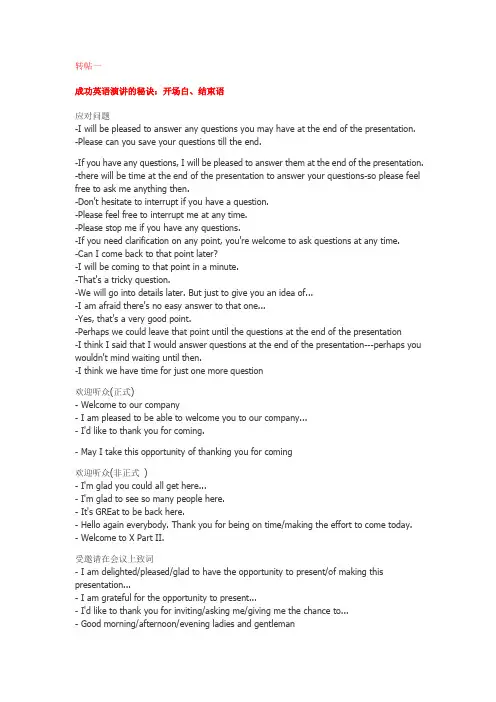
转帖一成功英语演讲的秘诀:开场白、结束语应对问题-I will be pleased to answer any questions you may have at the end of the presentation. -Please can you save your questions till the end.-If you have any questions, I will be pleased to answer them at the end of the presentation. -there will be time at the end of the presentation to answer your questions-so please feel free to ask me anything then.-Don't hesitate to interrupt if you have a question.-Please feel free to interrupt me at any time.-Please stop me if you have any questions.-If you need clarification on any point, you're welcome to ask questions at any time.-Can I come back to that point later?-I will be coming to that point in a minute.-That's a tricky question.-We will go into details later. But just to give you an idea of...-I am afraid there's no easy answer to that one...-Yes, that's a very good point.-Perhaps we could leave that point until the questions at the end of the presentation-I think I said that I would answer questions at the end of the presentation---perhaps you wouldn't mind waiting until then.-I think we have time for just one more question欢迎听众(正式)- Welcome to our company- I am pleased to be able to welcome you to our company...- I'd like to thank you for coming.- May I take this opportunity of thanking you for coming欢迎听众(非正式)- I'm glad you could all get here...- I'm glad to see so many people here.- It's GREat to be back here.- Hello again everybody. Thank you for being on time/making the effort to come today. - Welcome to X Part II.受邀请在会议上致词- I am delighted/pleased/glad to have the opportunity to present/of making this presentation...- I am grateful for the opportunity to present...- I'd like to thank you for inviting/asking me/giving me the chance to...- Good morning/afternoon/evening ladies and gentleman- It's my pleasant duty today to...- I've been asked to...告知演讲的话题- the subject of my presentation is...- I shall be speaking today about...- My presentation concerns...- Today's topic is...- Today we are here to give a presentation on...- Today we are here to talk about...Before we start, I'd like you meet my team members... - A brief look at today's agenda...(告诉听众所讲内容的先后顺序)- Before we start our presentation, let's take a brief look at the agenda...- I shall be offering a brief analysis of...- the main area that I intend to cover in this presentation is...- Take a moment and think of...- Thank you for giving me the opportunity to tell you about...告诉听众发言的长度- During the next ten minutes, I shall...- I shall be speaking for about ten minutes...- My presentation will last for about ten minutes...- I won't take up more than ten minutes of your time...- I don't intend to speak for longer than ten minutes...- I know that time is short, so I intend to keep this brief- I have a lot to cram in to the next ten minutes, so I'd better make a start...引起听众的兴趣- I'm going to be speaking about something that is vitally important to all of us.- My presentation will help solve a problem that has puzzled people for years...- At the end of this presentation you will understand why this company has been so successful for so long...- I am going to be talking about a product that could double your profit margins...- the next ten minutes will change your attitude to sales and marketing...- Over the next ten minutes you are going to hear about something that will change the way your companies operate...- By the end of this presentation you will know all there is to know about...告诉听众内容要点- there are five main aspects to this topic (...the first, ... the second, ...a third, ...another, ... the final)- I am going to examine these topics in the following order (...first, ...next, ...after that, ...finally)- I've divided my talk into five parts...- I will deal with these topics in chronological order...- I'm going to start with a general overview and then focus on this particular problem (...ingeneral, ...more particularly).- I want to start with this particular topic, and then draw some more general conclusions from it (...specifically, ... in a wider context).- there are (a number of) factors that may affect...- We have to take into account in any discussion of this subject, the following considerations.- We all ought to be aware of the following points.结束语-In conclusion, I'd like to...-I'd like to finish by...-Finally...-By way of conclusion...-I hope I have made myself understood-I hope you have found this useful-I hope this has given you some idea/clear idea/an outline of...-Let me end by saying...-That, then was all I had to say on...-That concludes our presentation...-I hope I've managed to give you a clearer picture of...-If there are any questions, I'd be delighted to...-Thank you for your attention...-Let's break for a coffee at this point-I am afraid that the clock is against us, so we had better stop here-You have been a very attentive audience---thank you转自/abc/html/kouyujicui/20070821/4.html转帖二做presentation,我们要注意对话题的准备以及态度和身体语言等等,除此之外,我们还应该掌握一些常用句型。
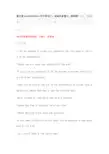
我们做presentation时不用怕了。
总结的真强大,转帖啦!来源:杨勇的日志转帖一成功英语演讲的秘诀:开场白、结束语应对问题-I will be pleased to answer any questions you may have at the en d of the presentation.-Please can you save your questions till the end.-If you have any questions, I will be pleased to answer them at th e end of the presentation.-there will be time at the end of the presentation to answer your q uestions-so please feel free to ask me anything then.-Don't hesitate to interrupt if you have a question.-Please feel free to interrupt me at any time.-Please stop me if you have any questions.-If you need clarification on any point, you're welcome to ask quest ions at any time.-Can I come back to that point later?-I will be coming to that point in a minute.-That's a tricky question.-We will go into details later. But just to give you an idea of...-I am afraid there's no easy answer to that one...-Yes, that's a very good point.-Perhaps we could leave that point until the questions at the end o f the presentation-I think I said that I would answer questions at the end of the pre sentation---perhaps you wouldn't mind waiting until then.-I think we have time for just one more question欢迎听众(正式)- Welcome to our company- I am pleased to be able to welcome you to our company...- I'd like to thank you for coming.- May I take this opportunity of thanking you for coming欢迎听众(非正式)- I'm glad you could all get here...- I'm glad to see so many people here.- It's GREat to be back here.- Hello again everybody. Thank you for being on time/making the e ffort to come today.- Welcome to X Part II.受邀请在会议上致词- I am delighted/pleased/glad to have the opportunity to present/of making this presentation...- I am grateful for the opportunity to present...- I'd like to thank you for inviting/asking me/giving me the chance to...- Good morning/afternoon/evening ladies and gentleman- It's my pleasant duty today to...- I've been asked to...告知演讲的话题- the subject of my presentation is...- I shall be speaking today about...- My presentation concerns...- Today's topic is...- Today we are here to give a presentation on...- Today we are here to talk about...Before we start, I'd like you m eet my team members...- A brief look at today's agenda...(告诉听众所讲内容的先后顺序)- Before we start our presentation, let's take a brief look at the ag enda...- I shall be offering a brief analysis of...- the main area that I intend to cover in this presentation is...- Take a moment and think of...- Thank you for giving me the opportunity to tell you about...告诉听众发言的长度- During the next ten minutes, I shall...- I shall be speaking for about ten minutes...- My presentation will last for about ten minutes...- I won't take up more than ten minutes of your time...- I don't intend to speak for longer than ten minutes...- I know that time is short, so I intend to keep this brief- I have a lot to cram in to the next ten minutes, so I'd better ma ke a start...引起听众的兴趣- I'm going to be speaking about something that is vitally important to all of us.- My presentation will help solve a problem that has puzzled people for years...- At the end of this presentation you will understand why this com pany has been so successful for so long...- I am going to be talking about a product that could double your profit margins...- the next ten minutes will change your attitude to sales and mark eting...- Over the next ten minutes you are going to hear about somethin g that will change the way your companies operate...- By the end of this presentation you will know all there is to kno w about...告诉听众内容要点- there are five main aspects to this topic (...the first, ... the secon d, ...a third, ...another, ... the final)- I am going to examine these topics in the following order (...first, ...next, ...after that, ...finally)- I've divided my talk into five parts...- I will deal with these topics in chronological order...- I'm going to start with a general overview and then focus on this particular problem (...in general, ...more particularly).- I want to start with this particular topic, and then draw some mo re general conclusions from it (...specifically, ... in a wider context). - there are (a number of) factors that may affect...- We have to take into account in any discussion of this subject, th e following considerations.- We all ought to be aware of the following points.结束语-In conclusion, I'd like to...-I'd like to finish by...-Finally...-By way of conclusion...-I hope I have made myself understood-I hope you have found this useful-I hope this has given you some idea/clear idea/an outline of...-Let me end by saying...-That, then was all I had to say on...-That concludes our presentation...-I hope I've managed to give you a clearer picture of...-If there are any questions, I'd be delighted to...-Thank you for your attention...-Let's break for a coffee at this point-I am afraid that the clock is against us, so we had better stop he re-You have been a very attentive audience---thank you做presentation,我们要注意对话题的准备以及态度和身体语言等等,除此之外,我们还应该掌握一些常用句型。
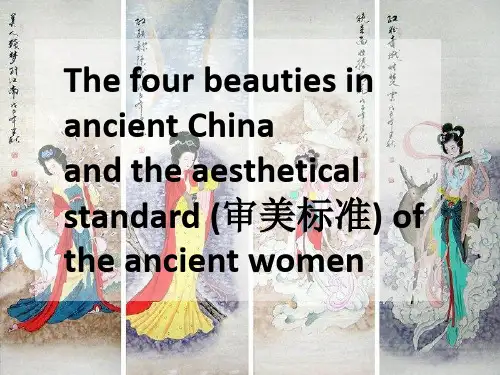
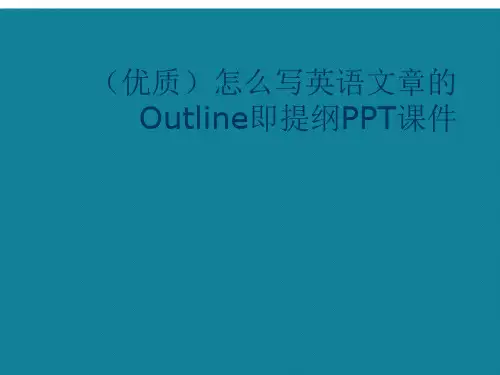

PRESENTATION,分组教学的具体运用以PRESENTATION为学习任务的分组教学是一种新型的教学模式,贵州财经大学商务学院英语教研室对其进行了实证研究,发现能够增添学生的学习兴趣、激发学生的创新思维和提高学生的口头表达能力等,同时对体制上的不足也提出了应对措施,以期推动三本院校向应用技术型大学成功转型。
Presentation;分组教学;英语教学改革分组教学(group instruction),又可称为合作学习(coopera-tive learning),二十世纪七十年代最先在美国实施。
分组教学,即把学生分成若干个小组,相互协作,来解决一个问题或完成老师布置的任务(Wenjing Zuo,2001:986)。
国外对分组教学模式的研究很多(Johnson D.and Johnson R.,1991),国内则刚刚起步。
刘明岩、郭颖、李珂等学者对分组教学如何运用到大学英语中来进行了初步的理论探讨,李庚敏、吴远航等认为分组教学能够提升大学英语口语教学质量。
然而,目前还没有人,将presentation(课堂陈述、课堂演讲)这种方式和大学英语分组教学结合起来,笔者在贵州财经大学商务学院进行实证研究,旨在探索这种全新的教学模式能够推动西部地区三本院校的英语教学改革。
一、研究对象及分组准备受试者是贵州财经大学商务学院大一新生,据笔者调查,他们以前没有接受过分组教学讨论模式,更没有做过presenta-tion。
他们做课件、上台做presentation都会接受实验组老师的指导。
商务学院在职英语教师有16人,分为两组,一组采用分组教学策略,剩下一组实施传统教学。
由于扩招,商务学院每个的人数较多,基本是60人左右。
六人一组,实验组的教师把每个班分为10组。
分组是以发卡片的形式随机分,红卡片发给女生,蓝卡片发给男生,确保组内性别平衡。
在商务学院,女生的英语水平一般情况下比男生好,仅有个别男生特别突出。
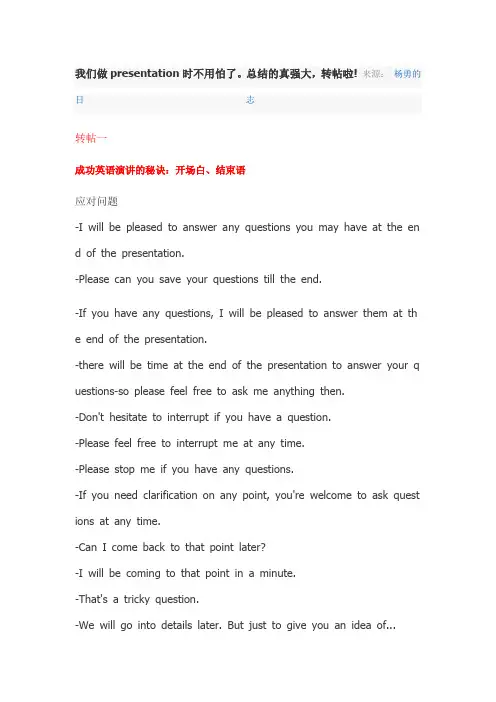
我们做presentation时不用怕了。
总结的真强大,转帖啦!来源:杨勇的日志转帖一成功英语演讲的秘诀:开场白、结束语应对问题-I will be pleased to answer any questions you may have at the en d of the presentation.-Please can you save your questions till the end.-If you have any questions, I will be pleased to answer them at th e end of the presentation.-there will be time at the end of the presentation to answer your q uestions-so please feel free to ask me anything then.-Don't hesitate to interrupt if you have a question.-Please feel free to interrupt me at any time.-Please stop me if you have any questions.-If you need clarification on any point, you're welcome to ask quest ions at any time.-Can I come back to that point later?-I will be coming to that point in a minute.-That's a tricky question.-We will go into details later. But just to give you an idea of...-I am afraid there's no easy answer to that one...-Yes, that's a very good point.-Perhaps we could leave that point until the questions at the end o f the presentation-I think I said that I would answer questions at the end of the pre sentation---perhaps you wouldn't mind waiting until then.-I think we have time for just one more question欢迎听众(正式)- Welcome to our company- I am pleased to be able to welcome you to our company...- I'd like to thank you for coming.- May I take this opportunity of thanking you for coming欢迎听众(非正式)- I'm glad you could all get here...- I'm glad to see so many people here.- It's GREat to be back here.- Hello again everybody. Thank you for being on time/making the e ffort to come today.- Welcome to X Part II.受邀请在会议上致词- I am delighted/pleased/glad to have the opportunity to present/ofmaking this presentation...- I am grateful for the opportunity to present...- I'd like to thank you for inviting/asking me/giving me the chance to...- Good morning/afternoon/evening ladies and gentleman- It's my pleasant duty today to...- I've been asked to...告知演讲的话题- the subject of my presentation is...- I shall be speaking today about...- My presentation concerns...- Today's topic is...- Today we are here to give a presentation on...- Today we are here to talk about...Before we start, I'd like you m eet my team members...- A brief look at today's agenda...(告诉听众所讲内容的先后顺序)- Before we start our presentation, let's take a brief look at the ag enda...- I shall be offering a brief analysis of...- the main area that I intend to cover in this presentation is...- Take a moment and think of...- Thank you for giving me the opportunity to tell you about...告诉听众发言的长度- During the next ten minutes, I shall...- I shall be speaking for about ten minutes...- My presentation will last for about ten minutes...- I won't take up more than ten minutes of your time...- I don't intend to speak for longer than ten minutes...- I know that time is short, so I intend to keep this brief- I have a lot to cram in to the next ten minutes, so I'd better ma ke a start...引起听众的兴趣- I'm going to be speaking about something that is vitally important to all of us.- My presentation will help solve a problem that has puzzled people for years...- At the end of this presentation you will understand why this com pany has been so successful for so long...- I am going to be talking about a product that could double your profit margins...- the next ten minutes will change your attitude to sales and mark eting...- Over the next ten minutes you are going to hear about somethin g that will change the way your companies operate...- By the end of this presentation you will know all there is to kno w about...告诉听众内容要点- there are five main aspects to this topic (...the first, ... the secon d, ...a third, ...another, ... the final)- I am going to examine these topics in the following order (...first, ...next, ...after that, ...finally)- I've divided my talk into five parts...- I will deal with these topics in chronological order...- I'm going to start with a general overview and then focus on this particular problem (...in general, ...more particularly).- I want to start with this particular topic, and then draw some mo re general conclusions from it (...specifically, ... in a wider context). - there are (a number of) factors that may affect...- We have to take into account in any discussion of this subject, th e following considerations.- We all ought to be aware of the following points.结束语-In conclusion, I'd like to...-I'd like to finish by...-Finally...-By way of conclusion...-I hope I have made myself understood-I hope you have found this useful-I hope this has given you some idea/clear idea/an outline of...-Let me end by saying...-That, then was all I had to say on...-That concludes our presentation...-I hope I've managed to give you a clearer picture of...-If there are any questions, I'd be delighted to...-Thank you for your attention...-Let's break for a coffee at this point-I am afraid that the clock is against us, so we had better stop he re-You have been a very attentive audience---thank you做presentation,我们要注意对话题的准备以及态度和身体语言等等,除此之外,我们还应该掌握一些常用句型。
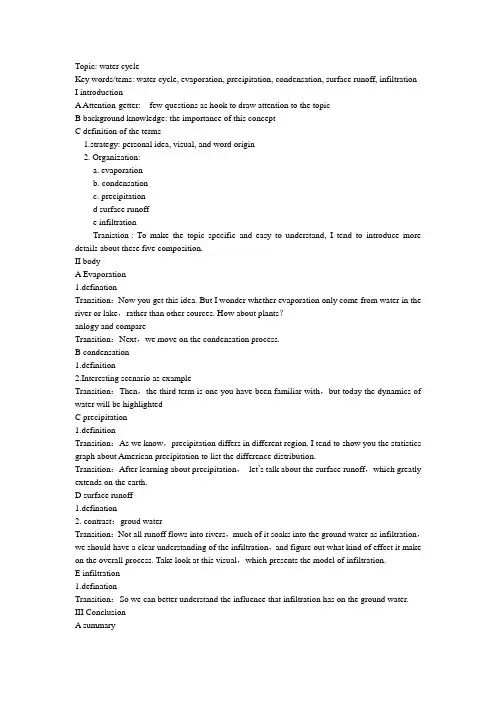
Topic: water cycleKey words/tems: water cycle, evaporation, precipitation, condensation, surface runoff, infiltration I introductionA Attention-getter: few questions as hook to draw attention to the topicB background knowledge: the importance of this conceptC definition of the terms1.strategy: personal idea, visual, and word origin2. Organization:a. evaporationb. condensationc. precipitationd surface runoffe infiltrationTranistion : To make the topic specific and easy to understand, I tend to introduce more details about these five composition.II bodyA Evaporation1.definationTransition:Now you get this idea. But I wonder whether evaporation only come from water in the river or lake,rather than other sources. How about plants?anlogy and compareTransition:Next,we move on the condensation process.B condensation1.definition2.Interesting scenario as exampleTransition:Then,the third term is one you have been familiar with,but today the dynamics of water will be highlightedC precipitation1.definitionTransition:As we know,precipitation differs in different region. I tend to show you the statistics graph about American precipitation to list the difference distribution.Transition:After learning about precipitation,let’s talk about the surface runoff,which greatly extends on the earth.D surface runoff1.defination2. contrast:groud waterTransition:Not all runoff flows into rivers,much of it soaks into the ground water as infiltration,we should have a clear understanding of the infiltration,and figure out what kind of effect it make on the overall process. Take look at this visual,which presents the model of infiltration.E infiltration1.definationTransition:So we can better understand the influence that infiltration has on the ground water.III ConclusionA summaryB Final words. After this course,it’s vital for everyone to enhance the understanding of water cycle,and recognize water resource is limited and essential to the ecosystem. We all should cherish water。
演讲outline写法第一篇:演讲outline写法OutlineTopic:Thesis: ______________________________ Introduction:____________________________Argument 1:Argument 2:Argument 3:Conclusion:___________________________第二篇:Speech Outline演讲提纲11511010219 陈萌(irene)Speech Outline Step One – Preparation A.Topic:environment problems B.Audience:citizen C.Title of speech:What should we do with the environment problems? D.Purpose of speech:To make people ware the global environment problems, and encourage people to protect the environment.Step Two – Introduction Main point:The Paris agreement came into effect on November 4th ,2016.At present, the environment problems are becoming more and more serious.It is necessary to take measures to protect environment.It is the responsibility of citizen.Step Three – Body Main Idea 1 •Idea: why do we need to pay attention to environmental problems? • Details/Examples:The signing of the Paris agreement means the global environment is not optimistic.Environment problems will threaten the survival of human.Main Idea 2 • Idea:What cause the environment pollution? •Details/Examples: air pollution(haze,industry), water pollution(drainage), soil pollution(used battery)Main Idea 3 •Idea: What should the government and citizen do?•Details/Examples: government(make laws, financial support...)citizen(drive green, monitor government...)11511010219 陈萌(irene)Step Four – Conclusion Summary of main point:We should take action to protect our environment for the survival of mankind.Call to action(optional):If we do not act and the measure of the government without efficient execution and strict supervision,it will likes the loaded M-16 without trained marine to pull the trigger!第三篇:Outline 4Social Movements of the 1960sI.Background---Greensboro Sit-in(格林斯博罗静坐)On February 1, 1960, 4 freshmen from a black college in Greensboro, North Carolina(北卡罗莱纳州), sat down at a department lunch counter and ordered coffee.When refused, they continued to sit at the counter, openly defying the segregation law prevailing in the state.The next day, more students joined them.Thus began the civil rights movement(黑人民权运动), which spread from the south to the ter, this quiet “sit-in” became the major nonviolent direct action tactics to be used by black civil rights activists.*The civil rights movement, and the youth anti-war, and the women’s liberation movements had long roots in United States history.(黑人民权运动、青年反战运动以及后来的妇女解放运动都深深地植根于美国历史之中)II.Definition---One professor argues that “a social movement is a type of behavior in which a large number of participants consciously attempt to change existing institutions and establish a new orderof life.”---Two basic characteristics of all social movements: “structure”(有组织)and “spontaneity”(自发性)---Other necessary parts of a social movement are:1.a social base of people 人这一社会基础2.a “message” or ideology 思想体系3.the ability to spread the message and get more supporter 传播思想和得到更多支持者的能力III.The Civil Rights Movement---One of the most important of all social movement in the 1960s U.S.history.Rosa Park’s(罗莎•帕克斯)spontaneous action(自发行为)in 1955 was believed to be the true beginning of the civil rights movement.The black students’ sit-in at a department lunch counter in North Carolina touched off(触发,激起)the nationwide civil rights movement.During the first half of the decade, civil rights organizations like SNCC(the Student Nonviolent Coordinating Committee学生非暴力统一行动委员会), CORE(the Congress of Racial Equality争取种族平等大会), and SCLC(the Southern Christian Leadership Conference南部基督教领导联合会)struggled for racial integration by providing leadership, tactics, network and the people.In the latter half of the decade, some black organizations changed their nonviolent tactics, and emphasized on more radical means to end discrimination and raised the self image of the blacks.The civil rights movement produced such great leaders as Martin Luther King, Jr., and Malcolm X, who inspired a generation of both blacks and whites to devote their lives to fighting for racial equality in the U.S.---Montgomery Bus Boycott蒙哥马利抵制公交车隔离政策运动In December 1995, Rosa Parks, a NAACP(National Association for the Advancement of Colored People(美国)全国有色人种协进会)member in Montgomery Alabama, refused to giveup herseat to a white man on a public bus.Alabama law required that blacks sit at the back of the bus, and when asked, surrender their seats to whites.Mrs.Parks was arrested.Local black leaders decided to boycott the city’s bus system.Black people i n the city spontaneously began to boycott the bus system refusing to ride on public buses.In the year long Montgomery bus boycott, blacks young and old, walked to work.With the bus company near bankruptcy, and the aid of a 1956 Supreme Court decision, Montgomery blacks triumphed.In fact, the boycott was believed to be the true.---Direct Action Tactics直接行动策略When the civil rights movement began, non-violent direct action tactics like “sit-ins” and “freedom rides”(自由乘车运动), voter registration(投票者登记).Later, anti-war activists added “teach-ins” on college campuses,((大学师生举行的)时事宣讲会,讨论会,辩论会)to educate people about the war in Vietnam as well as protest marches and rallies and etc.---Martin Luther King, Jr.Martin Luther King, Jr., an Atlanta-born Baptist minister(浸礼会牧师), was the leader of the Southern Christian Leadership Conference during the civil rights movement of the 1960s.To promote his philosophy of nonviolent protest against segregation and other kinds of social injustice, King organized a series of “marches”, including the March on Washington of August, 1963, when King delivered his famous “I have a Dream” speech.As a civil rights leader, King worked not only to end racial discrimination(种族歧视)0and poverty, but also to raise the self image of the blacks.Due to his strong belief in nonviolent peaceful protest, King was awarded the Nobel Peace Prize in 1964.He was assassinated in the city of Memphis(孟斐斯)in April 1968.---Contrary to King’s nonviolent tactics, Malcom X(马尔科姆•艾克斯)spoke in favour of black separatism(分离主义)and against nonviolence in fighting racial discrimination.---Some of SNCC(学生非暴力统一行动委员会)members thought they needed a strong leader rather than collective leadership.In 1965, they elected a new chairman, Stokeley Carmichael(斯托克利•卡迈克尔)who spoke about Black Power.*The most notorious terrorist group against black civil rights workers in the South was known as Ku Klux Klan三K党*Those who worked in the civil rights movement included Negro leaders, black and white young people, and some professionals and some housewives.IV.The Youth Movement *Many young people were involved in the social movements of the 1960 because they resented traditional white male values in U.S.society.---Free Speech MovementMario Savio(马里奥•萨维奥), a student who had just returned from working with SNCC in the Mississippi Freedom Summer, took off his shoes and stood on top of the police car.He demandedthat the CORE worker be freed and the rules against free speech be changed.The students sat around the car for 32 hours in spontaneous, nonviole nt, direct action.Other students “sat-in” at the administration buildings and organized “Free University” classes.The California governor called hundreds of police to the campus.800 students were arrested.Graduate students organized a strike and closed the university.The teachers and professors voted to change the rule that violate the 1st and 14th Amendments.The young people’s “Free Speech Movement” began with success.---“counter culture”(反主流文化)In the wake of the Free Speech Movement and the New Left appe ared a phenomenon that historians called the “counterculture”.The Counter Culture rejected capitalism and other American principles.They had morals different from taught by their parents.Some groups of youth tried to construct different ways of life.Among the most famous were the hippies(嬉皮士).They sought new experience through dropping out, drugs.But it was music, rock music in particular, that became the chief vehicle for the counter cultural assault on traditional American society.The counter culture exerted a great influence upon people’s attitudes toward social mores, marriage, career, and success.---The Anti-War Movement(against the war in Vietnam) V.Women’s Liberation MovementThe women’s movement in the 1960s was started by three groups of women and an accident.---1.a group of professional women who were appointed to a Commission on the Status of Women(妇女地位委员会)by President Kennedy in 1961.---2.white housewives and mothers who read Betty Friedan’s(贝蒂•弗里丹)book, The Feminine Mystique《女性之迷》, published in 1963.---3.young activists(激进主义分子, 行动主义分子)in the civil rights and anti-war movements.NOW((美国)全国妇女组织) ---With the publication of The Feminine Mystique in 1963, Betty Friedan became the chief spokesperson of the Women’s Liberation Movement.In her book, she compared the American family, or the American society as a whole, to a “comfortable concentration camp”, where women were discriminated against and oppressed.In 1966, she helped to found the National Organization for Women(NOW).A reform organization, NOW bat tled for “equal rights in partnership with men.”Canada: The Country and its PeopleI.A brief introduction of Canada(the geography, population, culture, economy, languages etc.)1)the 2nd largest country in size with a small population,2)has spectacular scenery of mountains, oceans, forests and prairies3)has a lively and rich culture4)one of the Big Seven(US, UK.Germany, France, Japan, Italy and Canada)in economy;has the best standards of living5)most Canadians live in the south of the country, along the 49th parallels(纬度)6)two official languages: English and French7)first become a political entity(政治实体)in 1867 and did not assume its present shape until 1949(直到1949年才具有目前的规模)(National Day: July 1st)II.The Canadian identity---It refers to something which is distinctively Canadian, which is different from other countries, and which is the very reason for making Canada so special.For example, two official languages of English and French can be considered as part of the Canadian identity.III.The regions of Canada---Motto: Canada stretches “from sea to sea” with the Pacific Ocean along the west coast and the Atlantic Ocean on the east coast---share with the U.S.the longest undefended national border in the world(加拿大和美国共享着世界上最长的不设防国界), a symbol of their good relations---consists of 10 provinces and 3 territories1.The north region of Canada---Canada extends up north into the Arctic Circle(北极圈)to the North pole.The north is a scarcely populated area of ice and oceans,which is sometimes called “the Land of th e Midnight Sun”(午夜太阳之地).This region is currently divided into threeadministrative territories—the Yukon(育空地区), the Northwest Territories and Nunavat(努勒维特地区a territory carved from eastern part of the original Northwest Territories in 1999).And most of the inhabitants are Aboriginal people.The traditional economy in this region was based on hunting and trapping animals for food and pelts, but now oil and gas deposits are also being developed.2.the west(西部1省)---the western-most province is British Columbia(布列颠哥伦比亚省)with 3 major mountain ranges running through it, among which the largest in ke Louise(路易斯湖), located in the Rockies, is the most famous image of the Canadian landscape (加拿大风景最突出的代表).BC is Canada’s 2nd largest producer of hydroelectric power.However, its main economic mainstay(支柱)is its forests.It has the most valuable forestry industry.3.The Prairies(草原3省)---The prairie provinces of Alberta(阿尔伯塔省), Saskatchewan(萨斯喀彻温省)and Manitoba(马尼托巴省)lie east of the Rockies(落基山脉).The prairies are flat and featureless and have a harsh continental climate.They are called the breadbasket(胃, 腹)of Canada because the land is well-suited to farming, and wheat is one of the biggest agricultural crops in this area.The prairies are also rich in energy resources.4.Central Canada(2省)---Central Canada, Ontario(安大略省)and Quebec(魁北克省), are the parts of the country that were first settled.They are the industrial heartland of the country and are also the most densely populated provinces.They have the largest cities like Toronto in Ontario, and the country’s 2nd largest city Montreal(蒙特利尔)in Quebec.The capital of the country Ottawa is also in Ontario.5.The Maritimes(滨海诸省:4个省)(theAtlantic regions)---The Atlantic provinces of New Brunswick(新不伦瑞克省), Nova Scotia(新斯科省the first part of Canada to be settled in 1604), Prince Edward Island(爱德华太子岛省)and Newfoundland(纽芬兰省the last province to join Canada in 1949)are also known as the Maritimes.They are small in population and largely rely on the fishing industry for their economic wealth.They are rich in farming and forestry products and are quite popular tourist attractions.IV.The history1.the First Nations(the Aboriginal people)---the native Indians with rich cultures and highly developed societies.2.European settlement in Canada---Settlement by European began in the 17th century.French colonists first settled Canada.The earliest major settlements were established in Nova Scotia in 1604 and Quebec in 1608.During earlier settlements, the French set the Company of New France and Bri tain founded the Hudson’s Bay Company to facilitate trade.3.In 1867 Canada was born when Quebec, Ontario, New Brunswick and Nova Scotia all join together into a confederation.The Government and Politics of CanadaI.Canada’s political system1.Canada’s poli tical system was greatly influenced by the two major foreign forces: Britain and America.2.American ideas influenced the Canadian system to some degree.For example, freedom of speech and freedom of information are much valued in contemporary Canada.So, Canadian society appears to be similar to American society, but they are different.While the US was founded on the idea of individualism---Americans aspire to “life, liberty and the pursuit of happiness”---Canadians choseto found a nation based on “peace, or der and good government”.In other words, for Canadians, the well-being and liberty of individuals must sometimes be sacrificed for the greater good of the community.3.Canadian society allows a high degree of tolerance of different values and customs.4.To find a workable balance between community and individual rights has been the central concern of Canadian policy-makers.5.It attempts to reconcile the two communities of English-speaking Canada and French-speaking Canada.II.Canada’s system of government1.based on the British system of parliamentary democracy, referred to as “Westminster-style” democracy英格兰东南部大伦敦的一个市区,位于泰晤士河岸。
Topic: water cycleKey words/tems: water cycle, evaporation, precipitation, condensation, surface runoff, infiltration I introductionA Attention-getter: few questions as hook to draw attention to the topicB background knowledge: the importance of this conceptC definition of the terms1.strategy: personal idea, visual, and word origin2. Organization:a. evaporationb. condensationc. precipitationd surface runoffe infiltrationTranistion : To make the topic specific and easy to understand, I tend to introduce more details about these five composition.II bodyA Evaporation1.definationTransition:Now you get this idea. But I wonder whether evaporation only come from water in the river or lake,rather than other sources. How about plants?anlogy and compareTransition:Next,we move on the condensation process.B condensation1.definition2.Interesting scenario as exampleTransition:Then,the third term is one you have been familiar with,but today the dynamics of water will be highlightedC precipitation1.definitionTransition:As we know,precipitation differs in different region. I tend to show you the statistics graph about American precipitation to list the difference distribution.Transition:After learning about precipitation,let’s talk about the surface runoff,which greatly extends on the earth.D surface runoff1.defination2. contrast:groud waterTransition:Not all runoff flows into rivers,much of it soaks into the ground water as infiltration,we should have a clear understanding of the infiltration,and figure out what kind of effect it make on the overall process. Take look at this visual,which presents the model of infiltration.E infiltration1.definationTransition:So we can better understand the influence that infiltration has on the ground water.III ConclusionA summaryB Final words. After this course,it’s vital for everyone to enhance the understanding of water cycle,and recognize water resource is limited and essential to the ecosystem. We all should cherish water。
英文PRESENTATION高手必备的常用表达,终于知道如何像乔布转帖一成功英语演讲的秘诀:开场白、结束语应对问题-I will be pleased to answer any questions you may have at t he end of the presentation.-Please can you save your questions till the end.-If you have any questions, I will be pleased to answer them at the end of the presentation.-there will be time at the end of the presentation to answer y our questions-so please feel free to ask me anything then.-Don't hesitate to interrupt if you have a question.-Please feel free to interrupt me at any time.-Please stop me if you have any questions.-If you need clarification on any point, you're welcome to ask questions at any time.-Can I come back to that point later?-I will be coming to that point in a minute.-That's a tricky question.-We will go into details later. But just to give you an idea of... -I am afraid there's no easy answer to that one...-Yes, that's a very good point.-Perhaps we could leave that point until the questions at the e nd of the presentation-I think I said that I would answer questions at the end of th e presentation---perhaps you wouldn't mind waiting until then. -I think we have time for just one more question欢迎听众(正式)- Welcome to our company- I am pleased to be able to welcome you to our company... - I'd like to thank you for coming.- May I take this opportunity of thanking you for coming欢迎听众(非正式)- I'm glad you could all get here...- I'm glad to see so many people here.- It's GREat to be back here.- Hello again everybody. Thank you for being on time/making the effort to come today.- Welcome to X Part II.受邀请在会议上致词- I am delighted/pleased/glad to have the opportunity to prese nt/of making this presentation...- I am grateful for the opportunity to present...- I'd like to thank you for inviting/asking me/giving me the ch ance to...- Good morning/afternoon/evening ladies and gentleman- It's my pleasant duty today to...- I've been asked to...告知演讲的话题- the subject of my presentation is...- I shall be speaking today about...- My presentation concerns...- Today's topic is...- Today we are here to give a presentation on...- Today we are here to talk about...Before we start, I'd like y ou meet my team members...- A brief look at today's agenda...(告诉听众所讲内容的先后顺序) - Before we start our presentation, let's take a brief look at th e agenda...- I shall be offering a brief analysis of...- the main area that I intend to cover in this presentation is... - Take a moment and think of...- Thank you for giving me the opportunity to tell you about... 告诉听众发言的长度- During the next ten minutes, I shall...- I shall be speaking for about ten minutes...- My presentation will last for about ten minutes...- I won't take up more than ten minutes of your time...- I don't intend to speak for longer than ten minutes...- I know that time is short, so I intend to keep this brief- I have a lot to cram in to the next ten minutes, so I'd bette r make a start...引起听众的兴趣- I'm going to be speaking about something that is vitally imp ortant to all of us.- My presentation will help solve a problem that has puzzled p eople for years...- At the end of this presentation you will understand why this company has been so successful for so long...- I am going to be talking about a product that could doubleyour profit margins...- the next ten minutes will change your attitude to sales and marketing...- Over the next ten minutes you are going to hear about som ething that will change the way your companies operate...- By the end of this presentation you will know all there is to know about...告诉听众内容要点- there are five main aspects to this topic (...the first, ... the s econd, ...a third, ...another, ... the final)- I am going to examine these topics in the following order (... first, ...next, ...after that, ...finally)- I've divided my talk into five parts...- I will deal with these topics in chronological order...- I'm going to start with a general overview and then focus o n this particular problem (...in general, ...more particularly).- I want to start with this particular topic, and then draw som e more general conclusions from it (...specifically, ... in a wider context).- there are (a number of) factors that may affect...- We have to take into account in any discussion of this subject, the following considerations.- We all ought to be aware of the following points.结束语-In conclusion, I'd like to...-I'd like to finish by...-Finally...-By way of conclusion...-I hope I have made myself understood-I hope you have found this useful-I hope this has given you some idea/clear idea/an outline of... -Let me end by saying...-That, then was all I had to say on...-That concludes our presentation...-I hope I've managed to give you a clearer picture of...-If there are any questions, I'd be delighted to...-Thank you for your attention...-Let's break for a coffee at this point-I am afraid that the clock is against us, so we had better sto p here-You have been a very attentive audience---thank you转帖二做presentation,我们要注意对话题的准备以及态度和身体语言等等,除此之外,我们还应该掌握一些常用句型。
uBlox-6M GPS开发板使用手册2013-01-281417电子工作室/宇新电子SBAS:WAAS,EGNOS,MSAS,GAGAN 启动时间:冷启动29 sec热启动<1 sec辅助启动<1 sec首次定位时间:<1 sec最大更新速率:<4Hz灵敏度:冷启动-144dBm跟踪灵敏度-160dBm捕获灵敏度-160dBm定位精度:Auto < 2.5mSBAS < 2m定时精度:RMS 30ns99% <60ns极限速度:500m/s运行温度:-40~85℃封装尺寸:16 ×12.2 ×2.4 mm1.5.3电气性能:工作电压: 2.7V~3.6V功耗:全速模式135mW 3.0VECO 模式129mW 3.0V备用电池: 1.4V~3.6V,25uA1.5.4接口协议:串行接口: 1 UART1 USB V2.0 全速12Mbit/s1 SPI其他接口: 1 时间脉冲输出1 外部中断输入协议:NMEA,UBX二进制1.5.5 芯片引脚引脚定义:第二章 开发板硬件介绍2.1 实物图2.2 结构布局开发板尺寸:35*65mm天线SMA 座电源开关电源指示灯5V 转3.3V 芯片 1117I2C 接口 USB 接口80mA 自恢复 保险 DC5V 插座 USB 选择 MS621充电电池uBlox-6M 装配孔PPS 指示灯 DB9 孔座: RS232 主要接计算机或单片开发板CMOS 串口接口,譬如:ARM 2440TTL 串口 接口 5V 的单片机 SPI 接口 TX 指示灯 RX 指示灯2.3 接口说明2.3.1 接口说明表标号名称说明1 NEO-6M主芯片NEO-6M主芯片2 电源输入DC5V输入2.3.2 I/O接口表第三章上位机软件使用说明3.1 连接方式3.2 使用串口调试助手1.打开光盘中的串口调试助手软件(uartassist.exe),根据自己电脑的实际串口选择串口号,默认的是COM1(我电脑的串口号是COM4)波特率:9600校验位:NONE数据位:8停止位:1设置好串口属性后,点击“打开”按钮,打开串口。
The Outline for Group Presentation (15 minutes)Part I The College Experience1. Summary:2. Important words and phrasesInformation explosion, drastically, Enroll, big-time sports, heavy drinking, information economy...3. Good Sentences:A.In 1990 fewer than 2 percent of Americans of traditional college age attended college. Today new.....some education beyond high school. (contrast)B.Depending on who you are, your life circumstances and why you decided to enroll, college can mean different things.C.For staters, college is an established process designed by our society to further formal education, so that students who attend and graduate will be prepared for roles in what has become known as "the information economy."D.D. The most important skill you’ll need to learn in college is how to keep learning throughout your life.4. Your creative ideas:What’s your definition of “college”?What is the most important skill for you to learn in college?(Work with your group members to finish the presentation. The above items are the basic information that your presentation has to include, and you can add something more to help others have a better understanding of this part. I hope you can do a good job!)The Outline for Group Presentation (15 minutes)Part II Why College Is Important to Our Society1. Summary:(1)(2)(3)2. Important words and phrasesUpward social mobility, level, equalize, ethnicity, lineage, merit, American dream...3. Good Sentences:A. College is the primary way that people achieve "upward social mobility" or the ability to attain a higher standard of living. (the skill of guessing the meaning of word)B. A college degree equalizes differences due to background, race, ethnicity, national origin, immigration status, family lineage, and personal connections.C. Simply put, college participation is about ensuring that more people have the opportunity to be evaluated on the basis of merit... (pay attention to "simply put") 4. Your creative ideas:Why college is important to our society? (Your opinion)(Work with your group members to finish the group presentation. The above items are the basic information that your presentation has to include, and you can add something more to help others have a better understanding of this part. I hope you can do a good job!)The Outline for Group Presentation (15 minutes)Part III Why College Is Important for you?1. Summary:(In this part, the writer lists several points about the importance of college. Use one sentence to summarize each point.)2. Important words and phrasesCritical thinker, alliances, faculty, camaraderie, relive, fanatically, homecoming, alma mater, legacy, high-stake, obligation, upheaval, prior, .3. Good Sentences:A. College is about thinking and will help you understand how to become a "critical thinker"-someone who doesn't believe everything... (the skill of guessing words' meaning)B. Whatever your age, college can also be a time when you take some risks, learn new things, and meet new and different people...C. They have just been swept along by life’s events and, now, here they are.D. Some institutions will allow you to be “undecided” or “no preference” for a year or two.4. Your creative ideasWhy college is important for "you"? (your reason)The last sentence in this part is the writer's suggestion. Since you have experience one-year college life, what is your suggestion for the next-year's freshmen?(Work with your group members to finish the group presentation. The above items are the basic information that your presentation has to include, and you can add something more to help others have a better understanding of this part. I hope you can do a good job!)The Outline for Group Presentation (15 minutes)Part IV Outcomes of College1. Summary:2. Important words and phrasesMarketable, clarify, anticipate, accumulate, self-esteem, make a difference, future oriented, advertising claim, wellness, preventive, stress management, immediate...3. Good Sentences:A. You will take advantage of the many opportunities you'll have to learn the skills of leadership, experience diversity, explore other...how you want to live.B. You will tend to be more flexible in your views, more future oriented, more willing to appreciate differences of opinion, and more interested in political and public affairs.4.Your creative ideasFour years later, which aspect of you do you expect to change? In other words, through the five-year college life, what kind of person do you expect to become?(Work with your group members to finish the group presentation. The above items are the basic information that your presentation has to include, and you can add something more to help others have a better understanding of this part. I hope you can do a good job!)。
The Outline for Group Presentation (15 minutes)Part I The College Experience1. Summary:2. Important words and phrasesInformation explosion, drastically, Enroll, big-time sports, heavy drinking, information economy...3. Good Sentences:A.In 1990 fewer than 2 percent of Americans of traditional college age attended college. Today new.....some education beyond high school. (contrast)B.Depending on who you are, your life circumstances and why you decided to enroll, college can mean different things.C.For staters, college is an established process designed by our society to further formal education, so that students who attend and graduate will be prepared for roles in what has become known as "the information economy."D.D. The most important skill you’ll need to learn in college is how to keep learning throughout your life.4. Your creative ideas:What’s your definition of “college”?What is the most important skill for you to learn in college?(Work with your group members to finish the presentation. The above items are the basic information that your presentation has to include, and you can add something more to help others have a better understanding of this part. I hope you can do a good job!)The Outline for Group Presentation (15 minutes)Part II Why College Is Important to Our Society1. Summary:(1)(2)(3)2. Important words and phrasesUpward social mobility, level, equalize, ethnicity, lineage, merit, American dream...3. Good Sentences:A. College is the primary way that people achieve "upward social mobility" or the ability to attain a higher standard of living. (the skill of guessing the meaning of word)B. A college degree equalizes differences due to background, race, ethnicity, national origin, immigration status, family lineage, and personal connections.C. Simply put, college participation is about ensuring that more people have the opportunity to be evaluated on the basis of merit... (pay attention to "simply put") 4. Your creative ideas:Why college is important to our society? (Your opinion)(Work with your group members to finish the group presentation. The above items are the basic information that your presentation has to include, and you can add something more to help others have a better understanding of this part. I hope you can do a good job!)The Outline for Group Presentation (15 minutes)Part III Why College Is Important for you?1. Summary:(In this part, the writer lists several points about the importance of college. Use one sentence to summarize each point.)2. Important words and phrasesCritical thinker, alliances, faculty, camaraderie, relive, fanatically, homecoming, alma mater, legacy, high-stake, obligation, upheaval, prior, .3. Good Sentences:A. College is about thinking and will help you understand how to become a "critical thinker"-someone who doesn't believe everything... (the skill of guessing words' meaning)B. Whatever your age, college can also be a time when you take some risks, learn new things, and meet new and different people...C. They have just been swept along by life’s events and, now, here they are.D. Some institutions will allow you to be “undecided” or “no preference” for a year or two.4. Your creative ideasWhy college is important for "you"? (your reason)The last sentence in this part is the writer's suggestion. Since you have experience one-year college life, what is your suggestion for the next-year's freshmen?(Work with your group members to finish the group presentation. The above items are the basic information that your presentation has to include, and you can add something more to help others have a better understanding of this part. I hope you can do a good job!)The Outline for Group Presentation (15 minutes)Part IV Outcomes of College1. Summary:2. Important words and phrasesMarketable, clarify, anticipate, accumulate, self-esteem, make a difference, future oriented, advertising claim, wellness, preventive, stress management, immediate...3. Good Sentences:A. You will take advantage of the many opportunities you'll have to learn the skills of leadership, experience diversity, explore other...how you want to live.B. You will tend to be more flexible in your views, more future oriented, more willing to appreciate differences of opinion, and more interested in political and public affairs.4.Your creative ideasFour years later, which aspect of you do you expect to change? In other words, through the five-year college life, what kind of person do you expect to become?(Work with your group members to finish the group presentation. The above items are the basic information that your presentation has to include, and you can add something more to help others have a better understanding of this part. I hope you can do a good job!)。